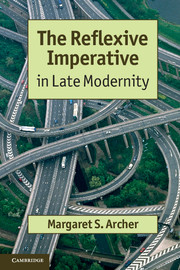Book contents
- Frontmatter
- Contents
- Figures
- Acknowledgements
- Introduction
- 1 A brief history of how reflexivity becomes imperative
- 2 The reflexive imperative versus habits and habitus
- 3 Reconceptualizing socialization as ‘relational reflexivity’
- 4 Communicative reflexivity and its decline
- 5 Autonomous reflexivity: the new spirit of social enterprise
- 6 Meta-reflexives: critics of market and state
- 7 Fractured reflexives: casualties of the reflexive imperative
- 8 Conclusion
- Methodological appendix
- Index
- References
3 - Reconceptualizing socialization as ‘relational reflexivity’
Published online by Cambridge University Press: 05 June 2012
- Frontmatter
- Contents
- Figures
- Acknowledgements
- Introduction
- 1 A brief history of how reflexivity becomes imperative
- 2 The reflexive imperative versus habits and habitus
- 3 Reconceptualizing socialization as ‘relational reflexivity’
- 4 Communicative reflexivity and its decline
- 5 Autonomous reflexivity: the new spirit of social enterprise
- 6 Meta-reflexives: critics of market and state
- 7 Fractured reflexives: casualties of the reflexive imperative
- 8 Conclusion
- Methodological appendix
- Index
- References
Summary
The best known theories of socialization are firmly embedded in modernity. These can look back to earlier social formations, where their major premises are invariably found to be even better exemplified. What they cannot do, however, is to shed the lineaments of modernity without launching into utopianism. This is of no assistance in explaining how young people come to be the persons that they are once nascent morphogenesis has engaged. When deviation–amplifying processes (introducing novelty with increasing speed) begin to exceed the effects of negative feedback loops that restore morphostasis in the social order, time is up for the theoretical assumptions about socialization that were endorsed throughout the line of succession stretching from Durkheim to Mead, Parsons, Habermas and Beck.
Traditional theories of socialization
Durkheim's contrast between members of a ‘segmented’ versus those of a ‘cooperative’ society was the first full appreciation of the intimate linkage between progressive societal differentiation and growing personal individuation. Nevertheless, he did not articulate a general theory of socialization associated with modernity and necessary to solve its macroscopic problems. This task fell to Mead who eschewed the macro-pathologies of modernity and focussed, instead, on the pivotal micro-role of socialization in dovetailing socio-functional differentiation with the individuation ineluctably associated with it. At its core, Mead introduced the concept of the ‘generalized other’ as an intrinsic part of the self without which we would have no conception of being ‘selves’. This replaced Durkheim's diffuse notions about people coming to realize their interdependencies with others as the lynchpin of social re-integration within modernity. In turn, the workings of the ‘generalized other’ relied upon a mechanism acknowledged only in the American pragmatist tradition – stretching from William James, through Peirce and Dewey – namely reflexivity, as exercised through what Mead usually termed the ‘inner conversation’. The role of reflexivity was abruptly severed by Parsons, never to be recovered within modernity's theories of socialization. What was lost with the shedding of this key aspect of Mead's patrimony was his recognition that in the early Durkheimian ‘segmented societies’ members of the group were largely practitioners of habitual action, in contrast to what frees us from the iron hand of ‘firmly organized habits’, namely the reflexivity enabling people to become ‘constructive conformers’ to the novel requirements of modernity.
- Type
- Chapter
- Information
- The Reflexive Imperative in Late Modernity , pp. 87 - 124Publisher: Cambridge University PressPrint publication year: 2012



